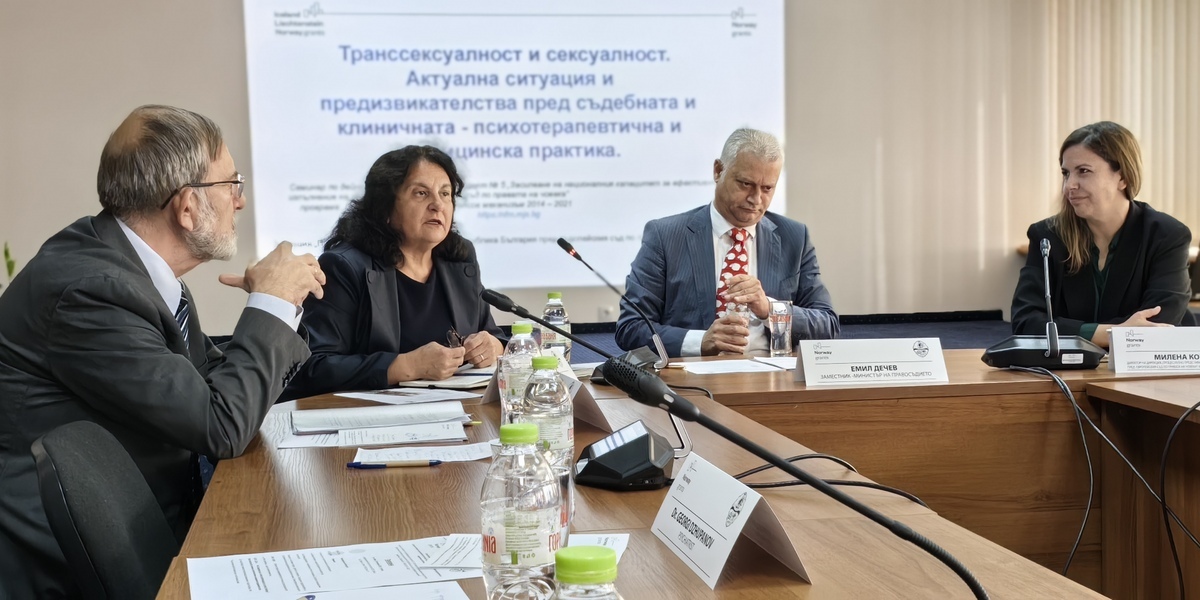17-10-2023 08:19
A seminar on: "Transgender and Sexuality. Current situation and challenges for forensic and clinical - psychotherapeutic and medical practice."
It was aimed at judges of all instances and was organised together with psychologists with the idea of taking an interdisciplinary approach to the problem of legal gender reassignment.
The event was opened by Mr. Emil Dechev, Deputy Minister of Justice and moderated by Ms. Mimosa Dimitrova, psychoanalyst, with many years of practice and founder of the Association "Bulgarian Psychoanalytic Space". The topics for debate were raised by the judge of the Constitutional Court - Dr. Philip Dimitrov and the special guest - Dr. Andre Michels, psychiatrist, psychoanalyst and lecturer with many years of experience in France and Luxembourg, who gives, respectively conducts his lectures, publications and practice with patients in several languages - French, German and English.
Judge Iliana Papazova from the Supreme Court of Cassation, Judge Andrey Georgiev from the Sofia District Court, Dr. Georgi Dzhupanov, a psychiatrist with a practice in Sofia, also commented expertly on the challenges of legal recognition of gender reassignment. Sofia. Ms. Milena Koceva, Director of the Directorate "Legal Representation of Bulgaria before the ECHR" at the Ministry of Justice, presented the challenges in relation to the implementation of the judgments against Bulgaria Y.T. and P.H. v. Bulgaria, in which a violation of the ECHR has been found and whose implementation has been placed by the Committee of Ministers of the Council of Europe in an enhanced monitoring procedure.
The Forum took into account the trends in relation to the rich and dynamically evolving practice and standards of the Strasbourg Court in similar cases, as well as the legislation of countries such as France and Germany, which have made the transition from criteria such as completed operational transformation as a requirement of legal recognition, towards the sufficiency of psychological processes such as the formation of a firm and unwavering decision to lead a life in a social role other than biological sex.
The place of gender identity disorders according to the International Classification of Diseases (WHO, 10th revision) was explained, highlighting the lack of universal, unambiguous and definitive medical markers for diagnosis at the biology/gene and hormone level. At the same time, the possibility of a convincing diagnosis of such conditions by means of psychological-psychiatric expertise was clarified, and it was recommended, in case of indications for this, to include in a complex expertise other expert such as endocrinologist, gynaecologist/andrologist; etc. Last but not least, and in relation to phenomena such as gender fluidity at a younger age, the experts stressed the need for longer-term follow-up in order to correctly diagnose and differentiate from other conditions.
The seminar was held in connection with the implementation of activity 5 of the redefined project No. 5 "Strengthening the national capacity for effective implementation of the judgments of the European Court of Human Rights", Justice Programme, NFM 2014 - 2021, implemented by the Directorate "Representation of the Republic of Bulgaria before the European Court of Human Rights", Ministry of Justice.






